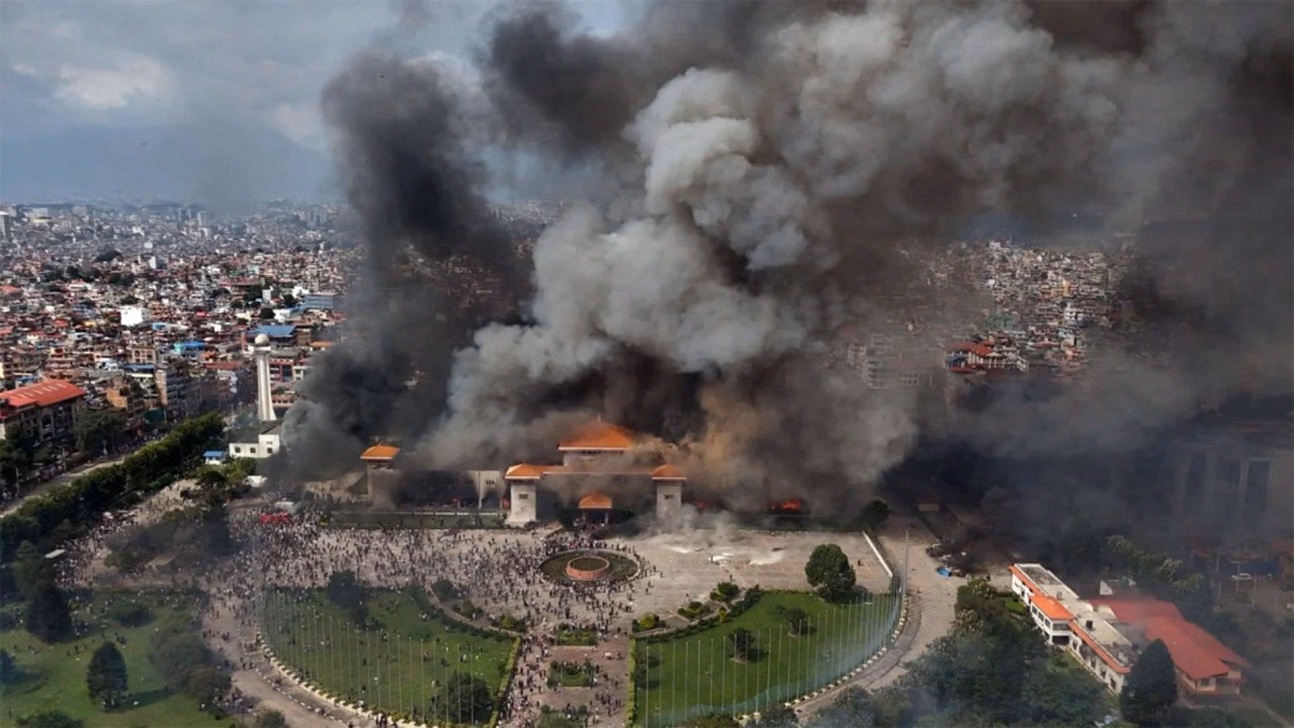
The South Asian state of Nepal saw the overthrow of Prime Minister KP Oli Sharma after a recent corruption scandal and a ban on social media. The heavy-handed police response during the protests only exacerbated the tension among the youth, which led to many government buildings being set ablaze across Kathmandu and chased out ministers across the country.
By Ahsan Ali
The youth-driven protests are frustrated by a system plagued by corruption and led by selected figures who prioritise their own political agendas. This led the youth to demand merit-based governance, greater transparency, anti-corruption probes and reorientation of domestic policies better to serve the ordinary citizens rather than the elites.
The recent crisis is a near resemblance to last year's toppling of Bangladeshi former Prime Minister Sheikh Hasina via the quota movement, whose control was authoritarian and repressive. Her authoritarian rule only led to mass mobilisation by the youth against her entrenched power, lack of political inclusivity and systematic corruption.
The protests reshaped the relationship between the state and citizens with more politically aware youth and a connected society. It has given a strong signal and a warning to the elite for their bureaucratic, political and economic control, which is stirring public discontent in the streets.
It further highlighted the lack of employment opportunities, fueling brain drain to the Middle East, ASEAN, and European countries for economic opportunities. Economic diversification and creating employment opportunities are essential for the successive government to implement new, effective policies and initiatives that attract foreign investment.
The new interim government setup of Prime Minister Sushila Karki is observed as a democratic consolidation with potential new young parties to run in the upcoming elections. The eight political parties have called the dissolution of parliament unconstitutional and the reinstatement of parliament, but the president urged restraint and conducting elections on the designated date.
Interim Prime Minister Karki faces pressure to draft and implement the necessary reforms in institutional transparency, decentralisation, and reducing nepotism. She has the responsibility for the ministries to modernise for practical performance evaluation and economic diversification.
In the aftermath of protests, economic stabilisation will be overseen by Nepalese, as citizens have already moved abroad for work opportunities. Young Nepalese will closely observe the financial stability to see how the reforms are being implemented.
Where the civil face pressure, the interim government may face pressure for prosecution of law enforcement over the killing of 72 protestors. There might be pressure to reform law enforcement, police professionalism and training, institutional reform, and accountability measures to restore public trust and prevent future social and security unrest.
Where the institutional oversight mechanism is a force for implementing internal audit accountability measures within the state, there will be institutional reform, accompanied by the restoration of meritocracy and integrity among the youth, as well as much-needed state reform.
While Nepal is engulfed in domestic turmoil and political instability, its foreign policy is bound to be impacted. Where the new interim government of Prime Minister Sushila Karki is set up, the domestic pressures are potentially pivoting foreign policy to be against India, which is a major regional player in the region.
China, which had already strengthened relations via investments and trade deals with connectivity projects under the previous administration, emphasised reduced over-reliance. China may seek economic reassurance over its strategic influence due to its investments.
Whereas India may seek a recalibration of relations between the two states, Indian influence in Bangladesh, particularly through Hasina, may prompt the Nepalese to distance themselves from India. Instead, a balanced foreign policy with an assertive approach and no over-dependence on any partner, while asserting national autonomy, may be the more effective strategy.
With stable political stability, elections would attract foreign direct investment (FDI) with confidence among investors. It would also enable controlled migration, facilitate cross-border management, and strengthen economic partnerships while preserving sovereignty.
Nepal’s former Chief Justice Sushila Karki has been appointed as the country’s new interim prime minister, following days of deadly youth protests. The office of President Ramchandra Poudel announced Karki’s appointment on Friday, September 12, and she was sworn into office as the country’s first-ever female prime minister later that day.







Namasté, and thank you for this superbly written, detailed analysis of Nepal's political crisis.